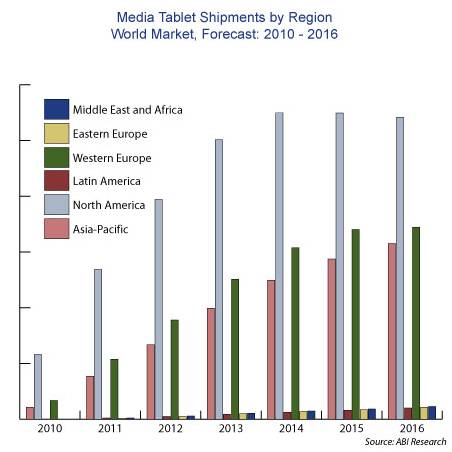Extracted from an interesting article from Jeff Orr from ABI research, “We have all heard about leaked company roadmaps that detail a vendor’s product or service plans for the next year or two. Typically, putting one’s plans down in advance of public announcement has two intended audiences: customers who rely on roadmaps to demonstrate that a vendor has “staying power,” and supplier partners who communicate commitment to the supply chain and relay future requirements. These plans generally are well guarded secrets and those getting to view them often have to sign a non-disclosure agreement saying they will not share the information with other parties. But what happens when suppliers decide to enter the market and compete head-on with those vendors that have confided their companies’ futures?”
This article is targeting Microsoft and Google strategies, which is basically to start competing with their (probably former?) partners, the Media Tablet manufacturers. In the conclusion, the author doesn’t look overoptimistic about the positive return from such a strategy: if it’s successful or if the OS vendor can finally reach level of sales for his tablet comparable to Apple, and by the way the same level of profit, as this should be the ultimate goal (!), then “the OS vendors will find it increasingly difficult to rebuild the former trust with the device ecosystem”. And, if the OS vendor fails, “they will have caused irreparable harm to the mobile device markets”. Look like a superb lose-lose strategy, isn’t it?
The important information which can also be found in this article, even if it is relatively hidden, is: theprotection given by an NDA is an illusion!
In other words, signing an NDA with a partner (who could become a competitor) is absolutely useless. You may protect a technology or some product features with patents. But a NDA has never prevented a so-call partner to steal your idea, or to duplicate your product roadmap! I remember one of my customer, at the end of the 1990’s, developing and ASSP with our ASIC technology. The device was ARM based modem providing Ethernet connection for printers and the like; it was a good business for both of us, generating large volumes, when this customer decided to challenge our prices and submit a RFQ to one of our competitor (based in Korea, with a “S” at the beginning of the name). This customer finally stayed with us, but less than one year later, Sxxx was launching a direct competing product! I am sure that our customer has signed a NDA with this ASIC supplier…
I firmly believe that NDA are USELESS (except if you love to waste time in additional legal work). I also firmly believe that I will continue to sign NDA with customers or partners for a long time, just because that’s the way it works!
Eric Esteve from IPnest
Share this post via:







A Century of Miracles: From the FET’s Inception to the Horizons Ahead